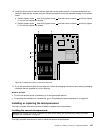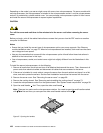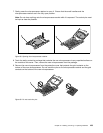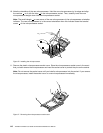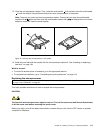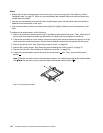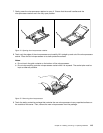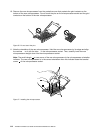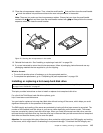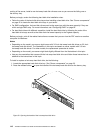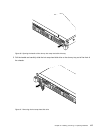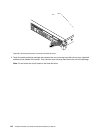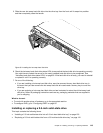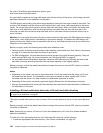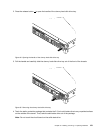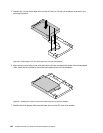
12. Close the microprocessor retainer. Then, close the small handle 1 rst and then close the small handle
2 to lock the retainer into position and secure the new microprocessor in the socket.
Note: There are two marks on the microprocessor retainer. Ensure that you close the small handle
marked with rst and then close the small handle marked with . Always follow the correct
sequence when you close the small handles.
Figure78. Securing the microprocessor in the socket
13. Reinstall the heat sink. See “Installing or replacing a heat sink” on page 104.
14. If you are instructed to return the old microprocessor, follow all packaging instructions and use any
packaging materials that are supplied to you for shipping.
What to do next:
• To work with another piece of hardware, go to the appropriate section.
• To complete the replacement, go to “Completing the parts replacement” on page 154.
Installing or replacing a hot-swap hard disk drive
Attention: Do not open your server or attempt any repair before reading and understanding “Safety information”
on page iii and “Guidelines” on page 67.
This topic provides instructions on how to install or replace a hot-swap hard disk drive.
For a list of the ThinkServer hard disk drive options, go to:
http://www.lenovo.com/thinkserver
You can install or replace a hot-swap hard disk drive without turning off the server, which helps you avoid
signicant interruption to the operation of the system.
The EMI integrity and cooling of the server are protected by having all drive bays covered or occupied. The
number of the installed hard disk drives in your server varies depending on the server model. The vacant
bays are occupied by dummy hard-disk-drive trays. When you install a hot-swap hard disk drive, save the
removed dummy hard-disk-drive tray from the drive bay in the event that you later remove the hot-swap hard
disk drive and need the dummy tray to cover the place.
Attention: An unoccupied drive bay without any other protection might impact the EMI integrity and cooling
of the server, which might result in overheating or component damage. To maintain the EMI integrity and
Chapter 6. Installing, removing, or replacing hardware 115



